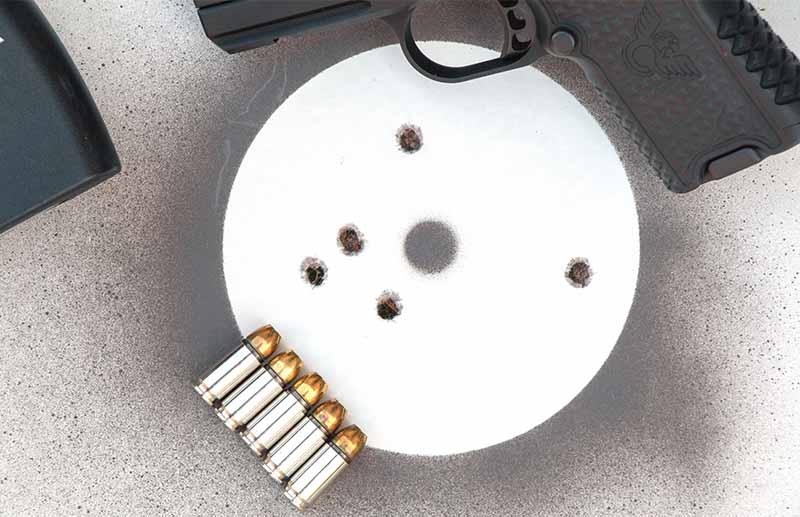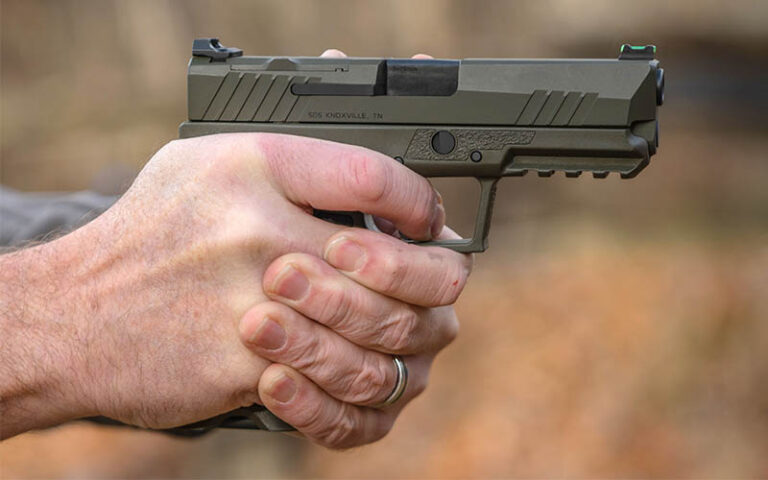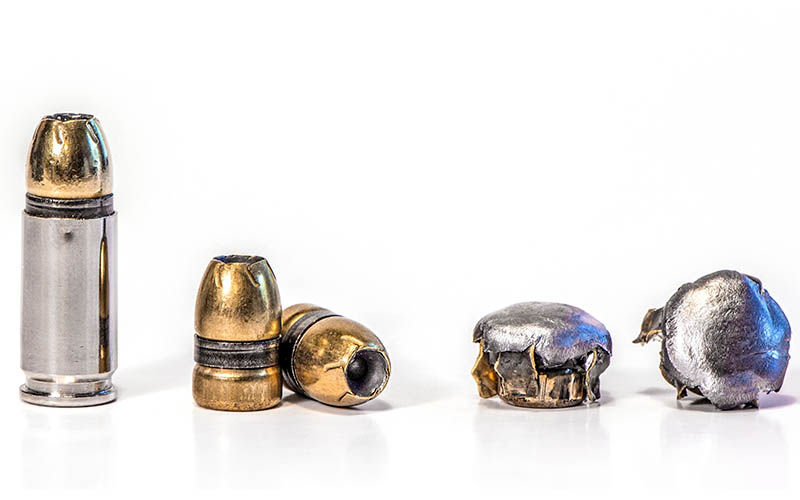https://gundigest.com/more/how-to/firearm-training/defensive-handgun-accuracyBy Richard A. Mann -August 14, 2023
A discussion on how to measure your defensive handgun accuracy and precision skills.The ability of a handgun to stop a threat is often debated. Most often these debates center around the cartridge the handgun is chambered for, and/or the type of ammunition being used. Though terminal performance is a very important part of the stopping equation, shot placement matters, too. In fact, disregarding extremes, shot placement might matter more than anything. The ability of a handgun to deliver the shot placement you desire depends on two things: accuracy and precision.
An accurate handgun will place the bullets where you want them. The more precision a gun delivers, the smaller the target you will be able to hit. For example, if you can hit a softball at 10 yards every time with your handgun, it’s accurate. If you can hit a golf ball at 10 yards every time, your handgun is accurate and has a high level of precision.
So, regarding self-defense handguns, how much precision do you need?
This, of course, could vary greatly depending on the situation you might be in. However, most self-defense shootings occur within about 10 yards. If your handgun can keep all its shots inside a softball at that distance, that should be good enough.
But, it’s not as simple as that.
A softball has a diameter of 3.5 inches. If your handgun will shoot 3.5-inch groups at 10 yards, it will hit a softball every time at that distance. But that’s what the handgun is capable of, not what you’re capable of. You’ll have to do everything perfectly to deliver that level of precision and, while you might be capable of doing that on the range, you won’t do it in a high-stress self-defense shooting situation.

Under stress, you want to be able to deliver softball-sized groups. The chances are your pistol is capable. The question is, are you?
Precision NeededFor argument’s sake, let’s assume that if you can place your shots within 1.75 inches of where you’re aiming, that’s good enough for self-defense. In other words, we’re saying that softball size—3.5-inch groups—are sufficient.
But, to account for shooting under stress, let’s assume that your 3.5-inch groups will turn into soccer ball-sized groups. Like some have said: Your worst shot in training will be your best shot when under stress. If you’re only going to shoot half as well under stress, you need to shoot twice as good during practice.
Precision AvailableAt the risk of restating the obvious, our goal is for our handgun to deliver 1.75-inch groups at 10 yards. This is usually determined by shooting from a rest. The question is, how high of a hurdle is that to clear for modern defensive handguns? Is that an unreasonable expectation?
I recently tested 11 new for 2022 defensive handguns by shooting them from a bench at 10 yards using self-defense capable ammunition. Three groups of five shots each were fired with each handgun, and the average for all groups and all handguns was 1.74 inches. As an average, that’s not very reassuring. However, the average was drastically skewed by a single handgun that only delivered groups measuring about 4 inches. That’s bad considering that—under stress, with that handgun—you’re in the range of soccer ball-sized groups again.

Somewhat surprisingly, the $500 Tisas PX-9 Gen III delivered the best precision of all the defensive handguns tested.
If we take that poor performer out of the mix, the average drops to 1.51 inches. At 10 yards, 10 of the 11 handguns tested delivered the necessary precision for defensive use; except for the one, none had an average group size larger than 1.75 inches. Considering these 10 handguns, which included revolvers and semi-automatics from nine different manufacturers, with prices ranging from only $500 to $3,700, that’s not bad. It should give you confidence that just about any self-defense handgun will deliver the precision you need.
Best And WorseWhat might surprise you is which handguns delivered the best and worst precision. The smallest average group size was turned in by a pistol that has a suggested retail price of only $500. The worst precision—the one we excluded with the 4.02 group average—was delivered by a pistol with a suggested retail price of $561. Discounting this poor performance, the next largest average group size was delivered by a $600 pistol.
There were two very expensive pistols in the test. One had a suggested price of $2,895 and it turned in an impressive three-group average of 1.29 inches. The other, which was the most expensive gun tested, had a three-group average of 1.68 inches. This is larger than the 1.51 average for the 10 best shooting handguns. So, it would appear that the amount of money you spend may or may not matter when it comes to precision. Including the junk gun, the $3,700 handgun only out-shot three of the other nine pistols.
 Measuring Handgun Accuracy
Measuring Handgun AccuracyAccuracy, as we said, is the ability to hit what you’re aiming at. To some extent, accuracy is dictated by how well the gun is sighted in. You can have a very precise shooting handgun, but if it’s not sending bullets to where the sights are pointing, all that precision is of little benefit. On average, out of the box, these 11 handguns placed their groups within 1.7 inches of the point of aim. The handgun that had the best zero out of the box cost $700. The centers of its groups were within a half-inch of the point of aim.
Accuracy and precision all tie together. If you want to keep all your shots inside a softball at 10 yards when shooting under stress, you’ll need a gun capable of delivering a decent level of precision, but it will also need to be properly sighted in. Based on this test, I think you should expect to adjust the sights on any defensive handgun you might purchase, regardless of price.
I think this test proves you should be reasonably confident that no matter the defensive handgun you purchase, it should be capable of delivering a level of precision suitable for self-defense to about 10 yards. If it doesn’t, send it back for repair or trade it for a different handgun.
Sure, there are many other considerations when it comes to selecting a handgun, but with today’s modern handguns I’d say there’s a 91 percent chance they’ll provide all the precision you need. That also means that you’ll have to take the blame for any missing that occurs.
Editor's Note: This article originally appeared in the July 2022 issue of Gun Digest the Magazine.